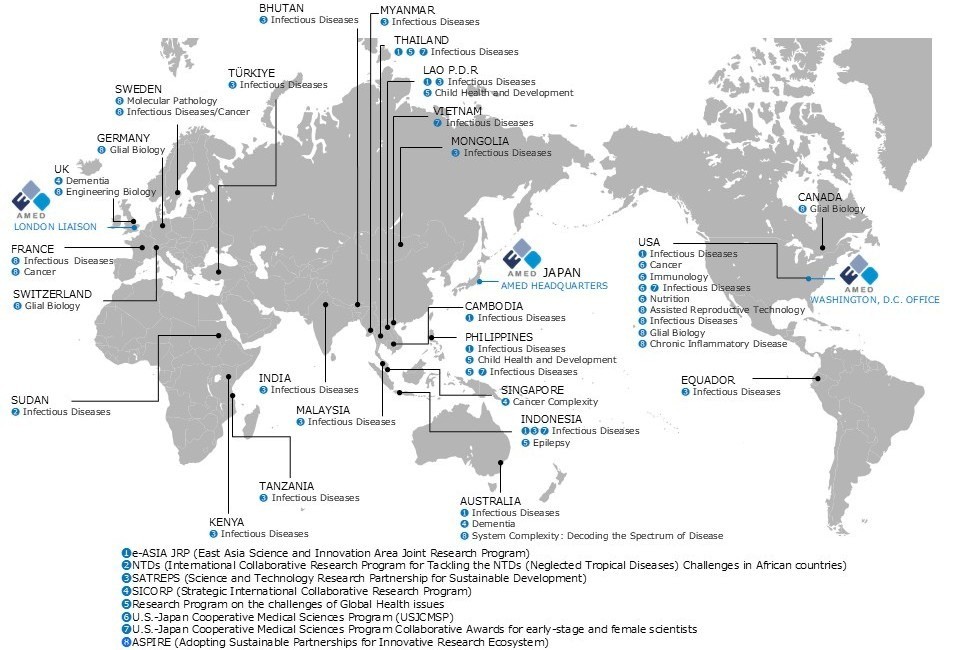Programs Department of International Strategy
We are advancing international collaboration for cutting-edge medical research and development, while also striving for international contributions through research and development that leads to the implementation of medical care in developing countries. We are committed to promoting advanced research and development by utilizing bilateral and international frameworks.
International Collaboration
AMED promotes bilateral and multilateral research collaboration by signing Memorandums of Cooperation (MOCs) or collaboration arrangements with funding agencies in other countries and international organizations that have high research potential in medical research.
| Country/Organization | Partner | Date of signature |
|---|---|---|
| US | National Institute of Health (NIH) | January 11, 2016 |
| National Academyof Medicine (NAM) | February 12, 2019 December 21, 2022 |
|
| Singapore | Agency for Science,Technology and Research (A*STAR) | March 16, 2016 |
| UK | Medical Research Council (MRC) | February 1, 2017 September 12, 2022 |
| Lithuania | Ministry of Health | March 9, 2017 |
| Spain | State Secretariat for Research, Development and Innovation (SEIDI) | April 5, 2017 |
| Australia | National Health and Medical Research Council (NHMRC) | October 17, 2018 November 30, 2022 |
| European Union (EU) | European Research Council (ERC) *Implementing Arrangement |
November 13, 2020 |
| CEPI | Coalition for Epidemic Preparedness Innovations (CEPI) | June 23, 2023 |
| HERA/European Commission | Health Emergency Preparedness and Response Authority (HERA) *Working Arrangement |
October 27, 2023 |
| South Africa | South African Medical Research Council (SAMRC) | August 28, 2024 |
| South Korea | Korea Health Industry Development Institute | March 28, 2025 |

as of May 2025
International Alliances and Consortia
AMED participates in international alliances and consortia listed below to strengthen partnership with other countries.
| Name |
|---|
| CDISC Clinical Data Interchange Standards Consortium |
| GA4GH Global Alliance for Genomics and Health |
| GloPID-R Global Research Collaboration for Infectious Disease Preparedness |
| HFSP(HFSPO)(AMED) Human Frontier Science Program |
| HIROs Heads of International Biomedical Research Organizations |
| ICRP International Cancer Research Partnership |
| IRDiRC International Rare Diseases Research Consortium |
| TT Translation Together |
Overseas Offices
We are making use of our overseas office and liaison to build international research networks and develop the research environments, to promote international joint research, to contribute to global health, and to nurture young researchers who are expected to flourish internationally.
AMED Overseas Activities | Japan Agency for Medical Research and Development
Division of Strategic Planning
Division of Research Programs
Last updated 06/06/25

